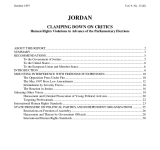Freedom of expression and press freedom are essential conditions for the conduct of free and fair elections. But in the pre-election period;; Jordanian authorities have used the laws in force;; and other means such as threats and intimidation by internal security forces and government officials;; to restrict free expression;; including press freedom;; in violation of the International Covenant on Civil and Political Rights (ICCPR);; which Jordan has ratified. This report documents a series of actions taken by the government to tame the print media -- including the temporary closure of thirteen weekly newspapers in September -- and intimidate political critics into silence. Journalists and editors told Human Rights Watch that they have followed a stricter regime of self-censorship since the amendments to the press law were implemented in May 1997;; for fear of being subjected to heavy financial penalties mandated under the new law. In addition;; students;; writers;; and researchers have faced a variety of sanctions -- ranging from detention;; criminal prosecution;; and imprisonment to harassment;; job loss;; and blacklisting -- because they expressed views on political subjects that the government preferred remain off-limits. Such measures have created an atmosphere in which the right to free expression is perceived by many in Jordan as under siege.
